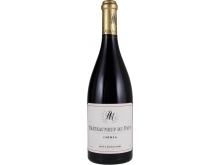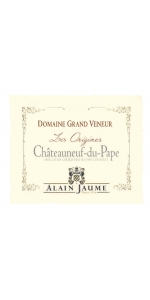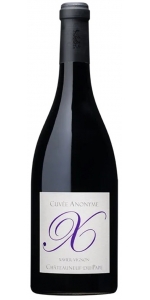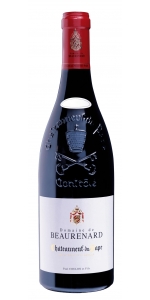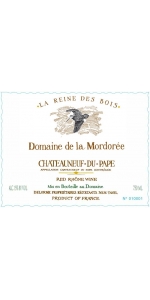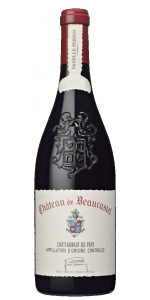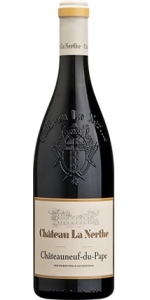Rotem & Mounir Saouma Chateauneuf-du-Pape Omnia Rouge 2019
6 bottles with free shipping for: $570.00
12 bottles with free shipping for: $1,080.00
| BUY MORE! SAVE MORE! | ||||||||||||||||||||
|
| Country: | France |
| Regions: | Rhone Chateauneuf du Pape |
| Winery: | Rotem & Mounir |
| Grape Type: | Grenache |
| Organic: | Yes |
| Vintage: | 2019 |
| Bottle Size: | 750 ml |
The aging is as Mounir ages his Burgundies: extremely long, never racked, no fining, no filtration. It would be easy to say that we expected the experience running one of Burgundy’s leading producers, Lucien Le Moine, would show in Mounir’s wines. But the actual results need to be tasted to be believed and understood: a wine with beguiling fruit and savory richness, yet extraordinary finesse and detail.
Mounir Saouma likes to describe Châteauneuf-du-Pape as a mosaic, with all the wild traditions and differences together making for very different interpretations. Omnia, Latin for “all,” is his attempt to encompass the entire region’s terroir and winemaking history (and perhaps future) in one glass. The fruit comes from 9 vineyard parcels across all 5 of the Châteauneuf communes, Châteauneuf-du-Pape, Courthezon, Sorgues, Bedarrides and Orange (in early vintages, when the Saoumas did not have all the vineyards they have today, they would purchase fruit; today, Rotem & Mounir Saouma is 100% Estate). The wine is then vinified and aged in foudres, cement and 500 liter barrels – a little bit of everything.
2019 was another warm and dry vintage in the southern Rhône, marked by insistent drought and repeated heat waves during the season. With little disease pressure or frost, the crop was close to normal size, but bunch and berry-size was reduced during the growing season by the lack of water. The grapes were thus concentrated and rich in sugar and acidity, although potential alcohol levels were often quite high. Vineyards at higher elevations – Châteauneuf du Pape and Gigondas in particular — handled the heat better, and the wines from those AOPs are rich yet also remarkably fresh and energetic. Despite the initial concerns about the growing season, 2019 looks to be a watershed vintage in the Southern Rhône, producing rich wines with exceptional concentration and aging potential
Inviting aromas of sliced strawberries, red cherries and rose. Full-bodied with vibrant acidity and succulent fruit. Fine, structured tannins are vertically aligned with the fruit. More dark-fruited than the nose lets on and entirely delicious. I love the subtle spice here.
-James Suckling 94 Points
Very refined, with silky and fine-grained structure carrying alluring bergamot, rooibos tea, incense, dried cherry and lightly mulled raspberry notes along. A long sanguine thread weaves through the finish. Hard to resist now with so much charm, but this will benefit from cellaring. Grenache, Syrah and Mourvèdre.
-Wine Spectator 94 Points
Burgundy meets the Rhone. An utter respect for tradition, and in some ways a total break. We’ve watched as Mounir and Rotem Saouma, of Burgundy producer Lucien Le Moine, slowly developed their estate and wines in Chateauneuf-du-Pape, and the results today are too extraordinary and distinct to ignore.
Let’s start at the beginning: 5 acres in Pignan. A sale was being conducted through the French state that presented the opportunity to buy a somewhat neglected parcel adjoining some oustanding plots (notably Rayas’ Bois de Rayas and the Pignan lieu dit). The Saoumas have long loved the area and its wines, have many friends, and saw they could potentially acquire land in a way that would not be possible in Burgundy.
The sheer vitality of these vines today is extraordinary. We know and love Mounir Saouma because of the way he transmits both unknown and acknowledged great crus of Burgundy through his elevage into masterpieces, but it turns out he may be an even more talented vineyard manager. Mounir’s philosophy is in theory straightforward. He has worked to improve drainage in his vineyards, works with organic manures, and doesn’t mind the low yields he is getting in his plots. As is the case with most things in life, simplicity appears only after deliberation and experience.
From this plot Mounir has been able to acquire additional vineyards, and today farms a total of 21 acres across 8 vineyards in all 5 villages of the appellation (Chateauneuf-du-Pape, Bedarrides, Sorgues, Courthezon and Orange). The kaleidiscope of the terroirs he works with is reflected in the cellar, as well, where a combination of barrels, foudres, cement, and eggs are used, all except the last of which can be considered “traditional” within the diversity of Chateauneuf’s viticultural history. The fruit is pressed firmly with small presses dating from the late 1970s, left in tank to macerate at relatively cool temperatures for 8 days, and then transferred to the various vessels. The wines are never punched down, never racked, and never sulfured until a light addition a month before bottling. They age for between 24-36 months, including the white, which as you might expect has an outsized focus here.
The wines are stunning: precise, intense, complex, expressive visions of Chateauneuf. They somehow speak to the past, but also to the present (and we would guess, the future), all in their own voice.
Grand Veneur Chateauneuf-du-Pape Rouge Les Origines is made from 50% Grenache, 30% Mourvedre and 20% Syrah
Matured in vats (grenache) and in oak casks (syrah and mourvèdre).
Deep and brilliant, purple-red colour. An exciting nose with aromas of black fruit (blackcurrant, cherry) spices and vanilla. This great aromatic complexity is found on the palate : the spices and ripe fruit appear with an elegant woodiness and harmonious tannins. The finish has good aromatic length and introduces a touch of liquorice and pepper.
A terrific Châteauneuf du Pape with great concentration and finesse.
Best between 2 and 20 years. Best to decant if young (less than 5 years old).
Soil type Extreme north of Châteauneuf du Pape. This plateau is made with a high quantity of red clay mixed with rocks. This area is considerated to be one of the best to produce rich and powerful red wines. By definition, LES ORIGINES will always deliver a great complexity and ageing potential. Winemaking & ageing Harvest is sorted by hand, destemmed and crushed. Fermentation temperature is controlled at 30°C. Vatting period of 18 to 20 days. Matured in vats (grenache) and in oak casks (syrah and mourvèdre).
Review:
"The 2019 Châteauneuf Du Pape Les Origines is also deep purple-hued and has a classic bouquet of crème de cassis and blackberry fruits intermixed with notions of graphite, chocolate, and spicy wood. Rich, full-bodied, and concentrated, this is beautifully done and despite its more modern elevage, it has plenty of Provençal character and charm."
- Jeb Dunnuck (October 2020), 94-96+ pts
"Warm in feel, with a gush of plum puree and blackberry paste flavors, liberally laced with black licorice and roasted alder notes. A solidly built, modern version, with a nice tug of warm earth on the back end. Best from 2022 through 2034. —J.M."
- Wine Spectator's Insider (June 9th 2021), 93 pts
Xavier Vignon Chateauneuf-du-Pape Rouge Cuvee Anonyme 2019 is made from 60% Grenache, 15% Mourvedre, 10% Syrah and the rest is "field blend" with the following grapes : grenache, vaccarese, counoise, mourvèdre, terret noir and muscardin.
One of Xavier Vignon's first almost anonymous blends only in MAGNUMS !
The grapes come from "collection vines", where many grape varieties are planted together, making it difficult to identify the exact share of each variety: grenache, vaccarese, counoise, mourvèdre, terret noir and muscardin.
Partially destemmed and vinified in a mix of demi-muids and tank, it offers a beautifully pure, vibrant bouquet of black raspberries, white and black pepper, candied orange, and violets. Complex, layered, and nuanced, this beauty is medium to full-bodied, has a seamless texture, and a great finish. It has both elegance and richness, and will keep for 15+ years.
Pairing: Duck in sauce with olives. Ravioli with porcini mushrooms, cream of parsnip and bacon crisps. Partridge leg confit with olive oil.
Review:
"The flagship from Xavier is the 2019 Châteauneuf Du Pape Cuvee Anonyme, and in 2019 it’s 60% Grenache, 15% Mourvèdre, 10% Syrah, and the balance a mix of permitted varieties. Partially destemmed and brought up in a mix of demi-muids and tank, it offers a beautifully pure, vibrant bouquet of black raspberries, white and black pepper, candied orange, and violets. Complex, layered, and nuanced, this beauty is medium to full-bodied, has a seamless texture, and a great finish. It has both elegance and richness, and will keep for 15+ years."
- Jeb Dunnuck (October 2020), 95-97 pt
Domaine de Beaurenard Chateauneuf-du-Pape is made from 65% Grenache, 15% Syrah, 10% Mourvèdre.
Domaine de Beaurenard’s flagship wine is a quintessential blend, reflecting all the diversity of the terroir and the perfect synergy that exists between the soils and the grapes. It offers a supple and refined texture associated with a delicate aromatic palette that is the result of a constant quest for freshness.
Review:
Checking in as a blend of 65% Grenache, 15% Syrah, 10% Mourvèdre, and the rest a handful of varieties, the 2019 Châteauneuf Du Pape was brought up in a mix of foudre and older barrels. This deep ruby/purple-hued effort has a pure, vibrant, incredibly seamless, medium to full-bodied style that carries classic notes of black raspberry and black cherry fruits as well as peppery herbs, violets, spring flowers, and sous bois. This straight-up gorgeous, seamless, ultra-fine 2019 should be snatched up by readers. It has a rare mix of elegance, purity, and power, and it’s going to have two decades of prime drinking.
-Jeb Dunnuck 95 Points
Mordoree Chateauneuf-du-Pape La Reine des Bois is made from Grenache 75 %, Mourvèdre 10%, Syrah 10 % , Counoise 3% & Vaccarese 2%.
This premium cuvee - whose name means "Queen of the Woods" - is from 65-year-old vines, planted on Villafranchian-era terrasses. Yield is 30 hl/ha.
Deep ruby red; opaque. Aromas of red fruits change to wooden touches of leather, black truffles and coffee. Fat, concentrated and full flavored with a very long liquoriced and fruity finish.
Pairs with red meats, sauce dishes, game animals (woodcock, wild boar) and semi mature cheeses.
Review:
"The 2019 Châteauneuf Du Pape Cuvée De La Reine des Bois is a deeper, more masculine wine with gorgeous cassis and blackberry fruits as well as graphite, licorice, crushed stone, violets, and lavender nuances. Rich, full-bodied, and incredibly concentrated, it has a brilliant sense of freshness and purity as well as length on the finish. It's going to require 4-5 years of bottle age, but this straight-up thrilling Châteauneuf du Pape will have 20-25 years of prime drinking."
- Jeb Dunnuck (November 2021), 98+ pts
Chateau de Beaucastel Chateauneuf-du-Pape Rouge is made from 30% each Grenache and Mourvèdre, with 10% each Counoise and Syrah, plus 20% other permitted varieties, including a healthy proportion of white grapes.
The story :
Château de Beaucastel has long been considered one of the great wines of France. It is unanimously renowned for its balance, elegance and ageing potential. Beaucastel has an extraordinary terroir at the Northern end of the appellation with heavy exposure to the Mistral. All 13 varieties of the appellation have been organically grown here since the sixties.
Location :
Châteauneuf du Pape, between Orange and Avignon, Château de Beaucastel red is a 70-hectare vineyard.
Terroir :
Château de Beaucastel is 110 hectares, with one single plot at the north of the appellation. The terroir is archetypal of the best terroirs in Châteauneuf: rolled pebbles on the surface, sand, clay and limestone deeper down. The vines are old and have been organically grown for 50 years, which has allowed the roots to grow exceptionally deep.
Beaucastel grows all thirteen grape varieties authorised by the appellation.
Ageing :
Each variety is harvested manually and separately. Vinification is completed in truncated oak barrels for the reductive grapes (Mourvèdre and Syrah) and in traditional tiled cement tanks for the oxidative grapes (such as Grenache). After the malolactic fermentations, the family blends the different varieties and then the wine ages in oak Foudres for a year before bottling.
Review:
deep, quite herbal expression, with liquorice and crushed blueberries to the cassis fruit. Full-bodied, powerfully fruited, dense and deep. Really mouthcoating, intense fruit. The tannins are ripe, fine and plentiful, all saturated in blackberry juice on a long finish. Certainly one of the more successful Châteauneufs this year. Will age well. A Mourvèdre-led expression of Beaucastel - it contains more than usual, at least 35% and probably more. Grenache and Cinsault fermented in cement, Syrah and Mourvèdre fermented in foudre. (MW) (9/2022)
-Decanter 96 Points
Chateau La Nerthe Chateauneuf-du-Pape Rouge is made from Grenache 39%, Mourvédre 33%, Syrah 25%, Cinsault 2%, Others 1%.
Château La Nerthe is one of the oldest estates in Châteauneuf-du-Pape and dates from 1560. Château La Nerthe has 227 acres of vineyards that surround the château and top the renowned La Crau plateau. The terroir is typical of the region. Vineyards run along a slope and grow in sandy-clay soils. The ground is covered by a layer of ‘galets’ – large, round, well-worn stones that were carried down from the Alps by glaciers during the last ice age. All the 13 permitted primary varietals are planted here. Grenache dominates 62% of the vineyards and the average vine age is over 40 years old. The grapes are hand harvested and sorted on tables. The grapes are then put into vats for almost 4 weeks with regular pump overs and punch downs. The must is tasted every day during fermentation to ensure the best extraction of the berry compounds. At the end, the wines are racked into oak vats for malolactic fermentation. The cuvée is then aged in large French oak casks and barrels for 12 months before blending. Bottling takes place 6 months later.
The dark, deep, inky color of the wine shows immediately, stemming from the concentration of the vintage. Nose of blackcurrants, black tea and dried flowers stands out. The mouth is rich, fruity and velvety with an incredibly layered tannic structure. The wine is balanced and pure with strong intense and incredibly long aging potential.
- One of the oldest estates in Châteauneuf-du-Pape - dates from 1560
- Estate grown, hand harvested, estate bottled
- Average vine age is 40+ years
- Certified AB Organic
Review:
A focused expression, this wine delivers pure red and black fruits unfolding against a delicate rose-petal backdrop. Silky yet chewy tannins gradually reveal layers of red cherry, pomegranate, spice, violets, and a hint of clove. Its elegance is underscored by fine tannins, suggesting a wine that, while quiet now, holds the promise of revealing its full beauty with time in the bottle. Cellaring through 2028+ before revisiting should prove to be rewarding.
-Wine Enthusiast 93 Points
- back
Fonseca Vintage Port 1966 has been pulled from a Gentleman's cellar, all wines from this cellar have been purchased by the owner either from the importer or direct from winery. They stayed in his cellar until being moved to the Timeless Wines warehouse.
Lismore Estate Syrah is made from 100 percent Syrah.
A careful selection of the best of the vintage that exemplifies the extraordinary terroir of Lismore.
An exotic experience which shifts your mind to another place. Cassis, brambles and succulent cherry. White pepper, classic garrigue and the strong floral perfume of crushed violets. Light and elegant, but structured with a fresh acidity. To experience the best this wine has to offer, decanting is suggested.
The grapes were fermented 40% whole bunch in a 5000 litre wooden fermenter with gentle pigeage throughout. The process allowed for a long extraction period which lends to the fruit expression of this wine. The wine was left for a 30 day extended maceration on the skins and then pressed in a traditional baskets press. Matured in 500 litre barrels for 10 months (35% new). Time in the bottle will allow integration, the deepening of layers and full expression of the fruit.
Review:
Bursting with purple flowers and savory, spicy notes, the 2022 Estate Reserve Syrah was made with 50% whole-cluster fruit, offering a crunchy, red-fruited nose that pops with delightful tertiary expressions of turned earth and pencil lead. Light to medium-bodied and with 12% alcohol, the wine compresses slightly to show an earthy, graphite edge on the palate while slightly stemmy notes sway with fine-grained tannins across the mid-palate. Flavors of potpourri with spiced cherry skin somersault with red and purple flower essences before finishing with hints of pink peppercorn over the elegant and elongated finish. Just under 5,000 bottles were produced after the wine spent 11 months in 25% new oak barrels.
-Wine Advocate 96 Points

